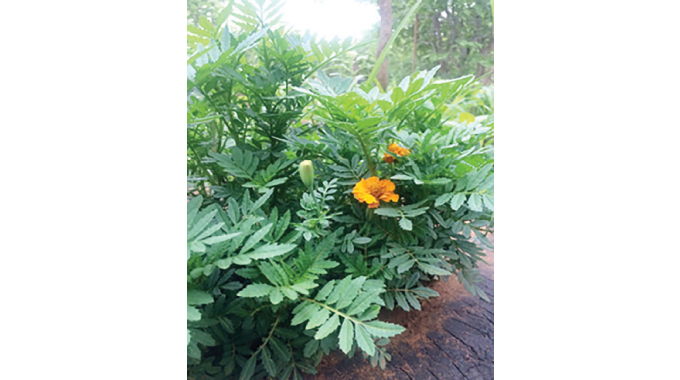Natural pesticides can save environment

Mahlabezulu Zulu
Being a citizen of a country, which has an agriculture-based economy is advantageous as people benefit.
Zimbabwe promotes natural resources conservation, especially wildlife through agricultural nature conservation principles which in most cases are easy and cheap to implement for those who practise agricultural activities.
This Covid-19 era has given most citizens time to explore and discover their talents in agriculture.
Realising the challenges of Covid-19 and its impact, many questions arise.
Are people practising cost effective agriculture?
Is it possible to successfully grow crops using locally available resources, for example, local plants or animal remains to control or promote growth of crops?
Due to population increase, and high demand for food worldwide, gardening activities are characterised by use of synthetic chemicals to control pests or fertilisers to promote plant growth.
Most of these tend to become environmentally unfriendly because they kill living organisms which are beneficial to us, for example, the bees which pollinate our crops and produce honey.
They also kill micro-organisms which decompose plant and animal remains improving soil structure and fertility.
Killing of such micro-organisms, disturbs the ecosystem.
The onset of rains is of benefit to gardeners.
Some gardens are run as family or community self-help projects supposed to benefit families and use cheaper inputs which are locally available, which tend to be environmentally friendly.
In growing crops, most gardeners have a challenge of trying to control pests which feed on their plants lowering both the quality and the yield of the crop.
Most gardeners have resorted to the traditional methods like crop rotation to control pests, and these are environmentally friendly methods which also promote conservation of soil.
As a conservationist, I would like to promote the use of natural pesticides and practising of certain gardening principles which are beneficial at the end.
Gardeners can make environmentally friendly pesticides from local plants or manure.
Pests, like any living organism, respond to unpleasant smells, they can be repelled and their disastrous effects on crops avoided.
A natural pesticide can be made from common plants; marigold (imbanje yonxiwa/muhungurira), chilli, mint plant, green bar soap pieces, onion or garlic.
In making the natural pesticides, the ingredients are cut into equal pieces, that is, a teacupful of each, put in 10 litres of hot water and then stirred thoroughly.
The mix is allowed to cool, and then later sprayed on crops as a natural pesticide.
The pesticide controls pests by its repelling effect from the unpleasant smell of chopped marigold, onion, garlic and mint plants.
While the same plants with a repelling effect can be used as part of ingredients of a natural pesticide, they can be inter-cropped or planted on the boundaries of a garden so that they repel pests by their unpleasant smell.
Use of liquid manure, that is, putting of twenty-five kilogram of any herbivorous animal manure, for example cattle or elephant manure, in a porous bag in a two-hundred-litre drum which is filled up to three quarters is not popular with most gardeners even if it works very well in improving soil fertility as well as controlling pests.
Liquid manure, applies the “tea bag” concept whereby manure is dissolved in a drum.
The solution is kept in a drum for two weeks, by then it would have fermented and produced an unpleasant smell, if the solution is applied to crops as a pesticide, it will prevent pests attack.
Since nutrients in the liquid manure bag would have been dissolved through the “tea bag” concept, the solution also supplies plants with nutrients when it is used to water garden crops, pot plants and lawns.
Use of such promotes cost effective gardening, existence of ecosystems which can be part of a gardening program, for example, aquaculture (fish farming).
A renowned gardener in Hwange District, Mr Aaron Ndlovu supports the use of ecologically-friendly practices in gardening.
“Environmentally friendly gardening programs should be encouraged as they are cost effective, and promote the existence of other agricultural activities.
Right now, if I was using synthetic pesticides and fertilisers, some of them could move with rain water to my fish pond and poison my tilapia fish I am keeping as part of my agriculture enterprise.”
Through his gardening experience of 10 years, he encouraged gardeners to take advantage of a common plant black jack/ucucuza/tsine, which can be used as a natural pesticide when it is chopped, boiled, allowed to cool then sprayed on vegetable crops.
Black jack can control a number of common garden pests.
Ash can also be used to control termites in the soil.
It is important to realise that when nature conservation concepts are applied in gardening projects they can play a vital role in the continuous existence of beneficial organisms like bees which pollinate our crops or fruit trees or produce honey and micro organisms which decompose organic matter to improve soil fertility for agricultural purpose.
A vulture which scavenges on a dead poisoned caterpillar or rat in a gardening project might be the last of that specie since some of them are already classified “endangered species”, hence become extinct.
We need cleaning of our environment by such species of wildlife species, hence the need to practise environmentally friendly methods in our agricultural activities for the survival of such species.
Mahlabezulu Zulu is a conservationist who has worked for various wildlife research, and conservation organisations in Hwange National Park and Fuller Forestry in Victoria Falls.
He can be contacted on 00263(0)713269827/0776196171. Email [email protected] or [email protected]











Comments